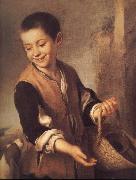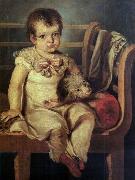Wholesale Oil Painting Reproductions No Minimum and Door to Door! |
|||||||||||
|
|
|||||||||||

|
|||||||||||
|
|
|
||||||||
All Bartolome Esteban Murillo Oil Paintings |
||||||||
|
|
||||||||
|
|
||||||||
|
Artist Introduction: Spanish
1618-1682
Bartolome Esteban Murillo Galleries
Murillo began his art studies under Juan del Castillo in Seville. Murillo became familiar with Flemish painting; the great commercial importance of Seville at the time ensured that he was also subject to influences from other regions. His first works were influenced by Zurbaran, Jusepe de Ribera and Alonso Cano, and he shared their strongly realist approach. As his painting developed, his more important works evolved towards the polished style that suited the bourgeois and aristocratic tastes of the time, demonstrated especially in his Roman Catholic religious works.
In 1642, at the age of 26 he moved to Madrid, where he most likely became familiar with the work of Velazquez, and would have seen the work of Venetian and Flemish masters in the royal collections; the rich colors and softly modeled forms of his subsequent work suggest these influences. He returned to Seville in 1645. In that year, he painted thirteen canvases for the monastery of St. Francisco el Grande in Seville which gave his reputation a well-deserved boost. Following the completion of a pair of pictures for the Seville Cathedral, he began to specialise in the themes that brought him his greatest successes, the Virgin and Child, and the Immaculate Conception.
After another period in Madrid, from 1658 to 1660, he returned to Seville. Here he was one of the founders of the Academia de Bellas Artes (Academy of Art), sharing its direction, in 1660, with the architect, Francisco Herrera the Younger. This was his period of greatest activity, and he received numerous important commissions, among them the altarpieces for the Augustinian monastery, the paintings for Santa Mar??a la Blanca (completed in 1665), and others. |
||||||||
|
|
||||||||
|
Boy with a Dog Painting ID:: 40491 |
mk156
1655-60
Oil oncanvs
70x60cm
|
|||||||
Height Width |
INS/CM Quality |
|||||||
|
X |
| |||||||
|
|
||||||||
All Antonio Jacobsen Oil Paintings |
||||||||
|
|
||||||||
|
|
||||||||
|
Artist Introduction: 1850-1921 Danish
(Resident in US)
was a maritime artist born in Copenhagen, Denmark, known as the "Audubon of Steam Vessels". Jacobsen painted over 6,000 portraits of sail and steam vessels, making him "the most prolific of marine artists". Many of his commissions came from sea captains, and Jacobsen was chosen both for the accuracy of his work and the low fees he commanded.
Jacobsen attended the Royal Academy of Design before heading across the Atlantic Ocean. He came to the United States in 1871, and settled in West Hoboken, New Jersey (now Union City, New Jersey), across the Hudson River from Manhattan and New York Harbor, its port filled with ships from America and around the world. Jacobsen got his start painting pictures of ships on safes, and as his reputation grew, he was asked to do portraits of ships by their owners, captains and crew members, with many of his works sold for five dollars.
|
||||||||
|
|
||||||||
|
|
Boy with a dog Painting ID:: 97332 |
1817(1817)
Medium oil on canvas
Dimensions 70 X 59 cm
cyf |
||||||
Height Width |
INS/CM Quality |
|||||||
|
X |
| |||||||
|
|
||||||||
|
Prev Next
|
||||||||
|
|
||||||||
|
Related Paintings to Antonio Jacobsen :. |
||||||||
|
|
||||||||
|
CONTACT US |


